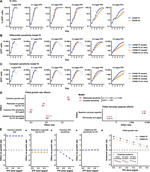The apparent interferon resistance of transmitted HIV-1 is possibly a consequence of enhanced replicative fitness
HIV-1 transmission involves a strong bottleneck, with new infections established by a very small number of virions. These founder viruses appear to be more resistant to interferon than viruses present at later stages of infection, but how (and why) this could be consistently selected for during transmission has remained unclear. We show that, instead of there being a specific molecular mechanism, such apparent resistance may be a simple consequence of how faster-growing viruses behave in typical inteferon-resistance experiments. Bottlenecks are expected to select for faster-growing viruses, but small differences in growth rate may not be apparent in typical growth curve experiments. Adding a growth rate inhibitor such as interferon (but also antiretroviral drugs targeting replication) slows down the entire experiment, allowing the lag phase to be observed and thus emphasising small growth rate differences.
More
The role of viral evolution in rabies host shifts and emergence
Rabies virus persists in species-specific cycles that rarely sustain transmission in alternative species. The determinants of these species-associations and the adaptive significance of genetic divergence between host-associated virus lineages are poorly understood. This review assesses various lines of evidence and proposes a synthetic hypothesis for the respective roles of ecology and evolution in rabies virus host shifts.
More

